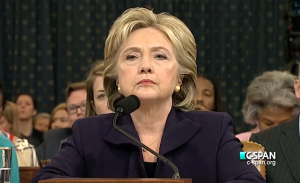Clinton’s Apologia
United States Secretary of State Hillary Clinton was found to have used a private server to handle classified emails in March of 2015. Although this is a violation of procedure, the issue of whether Hillary Clinton put United States security at risk because of this situation has been greatly debated. With this happening within the backdrop of Hillary’s campaign for the 2016 presidential election, it has become a greatly debated issue. I will examine how the Hillary Clinton campaign used multiple apologia strategies in handling the email controversy.
Clinton Email Damage Control:
Hillary Clinton and her campaign initially tried to downplay the incident as her using a private server as just a matter of Convenience, but the scandal continued and her opponents continued to push for more information about the emails. Clinton turned over 30,000 emails to the FBI and although her campaign initially stated that there was no classified information on her serve, it was later learned that was not entirely true. She then attempted to play off the issue with humor and stating her emails were “boring”. Finally on September of 2015 Hillary lamented and finally Apologized . Although this did not end the debate of whether she jeopardized national security, it is a great example of how important it is to properly frame your mistakes in campaign rhetoric.
Clinton’s Apologia Strategies:
Apologias serve to enable the candidate to explain some statement or behavior that casts doubts on the candidate’s suitability for office. The email scandal was a major blow to Hillary’s image as both Secretary of State and as a candidate for the office of president. Hillary’s damage control of the situation followed a lot of apologia strategies.
She initially tried to deny the severity of the issue and stating her use of a private server as a matter of convenience. Denial is a frequently used strategy in apologia to deny facts of charges or downplay the severity of events. Another strategy she used was bolstering about the situation by joking about her boring emails and making it seem like a mistake anyone could make. Bolstering is a strategy that is used to identify with something viewed favorably by the audience, and Clinton was attempting to make herself by looking more human by making it seem like a minor mistake and a few boring emails. The last strategy Clinton used was confession, and she finally admitted that she made a terrible mistake in using a private server to handle classified information and offered a full apology to the American people.
Whether this apology was effective is a matter of interpretation, but this whole scenario gives a real life example of the use of Apologia in a national election.


I feel like apologia was a smart move for Hiliary Clinton. Considering that this was an issue that could not be slipped under the rug, an apology was the only logical decision. Although I also feel like her waiting so long to offer a full apology and initially attempting to play the situation off was an error in judgement.
That, indeed was a smart move by Senator Clinton to apologize to the country on her actions with the email scandal. at this point, and with her being this far in the presidential race, the only way to face that problem was head on, addressing the issue and putting it to rest.
I also think the rhetorical strategy of bolstering, though used to try to lighten the situation, was not effective for many voters. I agree that voters thought it necessary for Hillary Clinton to issue an apology in order to attempt to put this issue to rest. While this apology could not get rid of the issue completely, it definitely helped many voters move on to focus on more on the election.